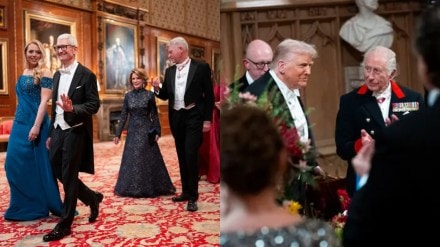President Donald Trump and King Charles III capped a day of pomp and pageantry at Windsor Castle, UK on Wednesday with an elaborate state banquet that blended quail egg salad with global dealmaking.
The glittering dinner drew some of the most powerful names in technology and finance. Apple’s Tim Cook, Nvidia’s Jensen Huang, OpenAI’s Sam Altman, Microsoft’s Satya Nadella, Salesforce’s Marc Benioff, Blackstone’s Steve Schwarzman, Citigroup’s Jane Fraser, and Arm’s Rene Haas were among the 160 distinguished guests. Their presence made clear that Trump’s second state visit to Britain was as much about business as ceremony.
Big numbers on the dinner table
The most striking element of the evening was not the food or the music but the promises on investment. The UK secured £150 billion ($205 billion) in fresh US commitments, with Blackstone alone pledging £100 billion. The funds will flow into artificial intelligence, nuclear power and financial services, reflecting Britain’s ambition to cement itself as a global hub for innovation.
American tech companies including Microsoft and OpenAI confirmed plans to spend tens of billions on UK infrastructure. In return, pharmaceutical giant GSK promised $30 billion of investment in the United States. Trump is expected to unveil a further $10 billion in economic agreements during his meeting with Prime Minister Keir Starmer on Thursday.
Business, politics and power
The Windsor guest list underlined the blending of political, financial and media influence. Alongside the tech titans sat senior Trump officials, MI6 chief Richard Moore, and media mogul Rupert Murdoch. For Trump, the dinner offered an opportunity to showcase American business power abroad; for Britain, it was a bid to secure investment at a time of economic uncertainty.
Yet the evening also reflected the delicate state of the “special relationship.” Britain has quietly dropped efforts to eliminate tariffs on UK steel exports, while Washington has raised concerns over the Online Safety Act and Starmer’s push for backdoor access to Apple’s cloud services, issues that jar with Silicon Valley.
What do we know about the Windsor Castle dinner?
Trump was feted with royal grandeur. A gilded Irish State Coach carried him and the King through Windsor’s gates, escorted by 120 horses and a 1,300-strong military contingent. The Red Arrows streaked overhead in red, white and blue, while a string orchestra performed Trump’s favourite Elton John and Rolling Stones hits.
Inside St George’s Hall, the guests dined on quail egg salad before sampling a 1945 vintage port, selected to honour the 45th president. First Lady Melania Trump, in a wide-brimmed hat, joined Queen Camilla, Prince William and Princess Catherine at the table, adding to the sense of spectacle.
Why the dinner matters?
For all the pageantry, the Windsor banquet was ultimately about business. With £150 billion in US investment secured, Britain won a symbolic and material victory. The gathering of global CEOs in the castle’s grand halls signalled a deliberate attempt to anchor the US-UK relationship in economic cooperation, even as trade disputes and political frictions persist.
Whether the gilded setting translates into lasting gains on trade, technology and security will be judged in the months ahead. But the spectacle at Windsor has already shown why this state dinner was as much a boardroom as a banquet.
